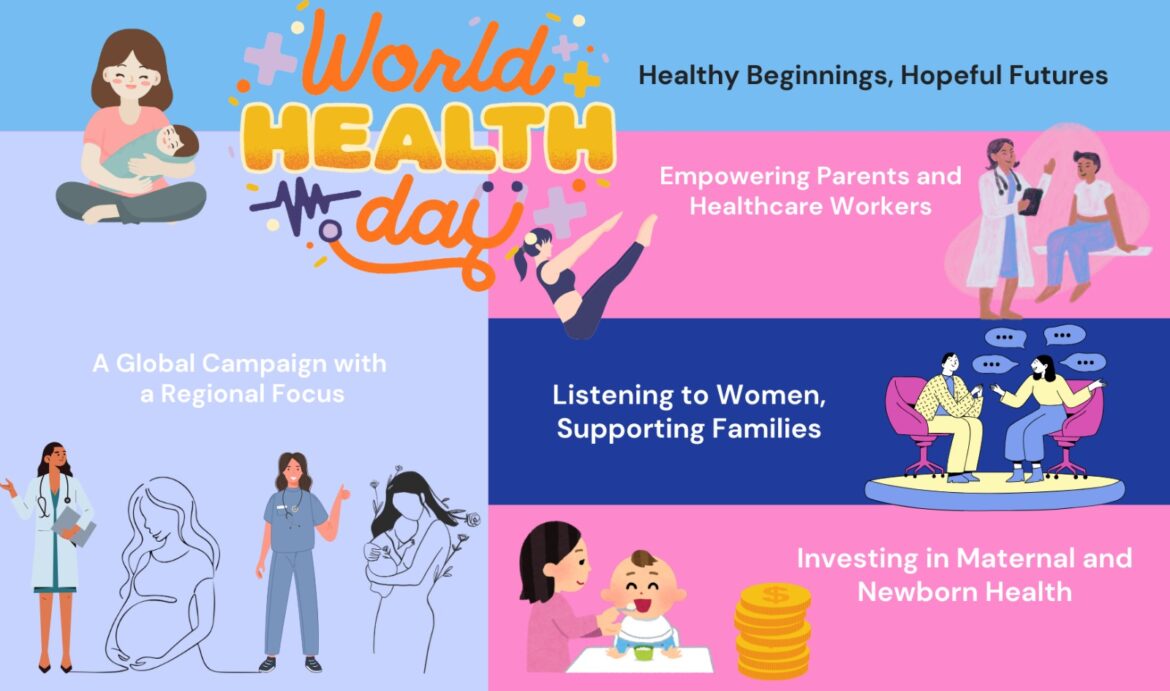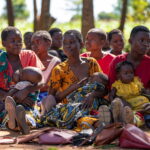On this year’s World Health Day, observed on April 7, 2025, the global community has united with a powerful call to action: Healthy Beginnings, Hopeful Futures. This theme marks the launch of a year-long campaign spearheaded by the World Health Organization (WHO), calling for renewed urgency in addressing one of the most heart-wrenching and preventable tragedies of our time — maternal and newborn deaths.
The Stark Reality
Each year, per data from the WHO, nearly 260,000 women worldwide die due to complications during pregnancy or childbirth. Out of this, southern Asia accounted for around 17% (43,000 deaths). These are not just statistics — these are daughters, mothers, and sisters whose deaths, in most cases, could have been prevented. Accompanying this grim tally are over 2 million newborn deaths within the first month of life, and another 2 million stillbirths, adding up to a devastating figure: one preventable death every 7 seconds.
In South Asia, which bears a significant share of this burden, the urgency is even more pronounced. Despite economic growth and expanded health systems, the region continues to face high maternal mortality rates, limited access to quality prenatal and postnatal care, and social inequities that often prevent women from receiving the support they need.
One of the most significant issues in the USA is the lack of disaggregated health data. South Asians are frequently grouped under broad racial categories such as “Asian American,” masking important variations in health outcomes. Studies have shown that women of Indian and Pakistani descent/origin in the U.S. experience higher rates of low birth weight and cesarean deliveries compared to other racial groups—but such findings are rare and often underreported. Without proper data, policymakers and healthcare providers cannot design interventions that genuinely meet the needs of South Asian families.
A Global Campaign with a Regional Focus
The Healthy Beginnings, Hopeful Futures campaign sets out with four clear goals:
- Raise awareness about the critical gaps in maternal and newborn survival, with an emphasis on the long-term health of women.
- Advocate for investments that improve healthcare infrastructure, training, and access for mothers and infants.
- Encourage collective action, engaging communities, governments, and healthcare providers in a unified front.
- Provide reliable health information about pregnancy, childbirth, and postpartum care to empower families.
In South Asia, where gender inequality, poverty, and healthcare accessibility remain formidable barriers, the campaign seeks not just policy change but a cultural shift that centers maternal and newborn well-being as a human right and a societal priority.
Listening to Women, Supporting Families
Too often, the voices of women are lost in healthcare systems designed without them. It is critical that through this campaign, we listen to women’s experiences — their needs, fears, and hopes — and design care that is both clinically effective and emotionally supportive. A woman’s journey through pregnancy, childbirth, and the postnatal period should not be fraught with risk. High-quality maternal and newborn care is not a privilege—it is a fundamental right.
This means:
- Scaling up access to quality obstetric and neonatal services, particularly in rural and underserved areas.
- Addressing mental health conditions like depression and anxiety and non-communicable diseases like hypertension and diabetes, which are rising contributors to maternal deaths.
- Ensuring postpartum care is comprehensive, supporting mothers physically and emotionally long after the birth.
- Enforcing policies that protect reproductive rights, workplace protections, guaranteed maternity leave, and eliminate gender-based violence.
- Family planning services to ensure that pregnancies are wanted and planned.
Steps Toward Equity and Culturally Responsive Care
To help every woman and baby thrive, efforts must include tailored solutions for South Asian communities in the USA, such as:
- Culturally competent healthcare training to address the unique concerns and practices within South Asian families.
- Targeted maternal health screenings, especially for diabetes and hypertension risks that disproportionately affect this group.
- Community outreach in native languages (Hindi, Urdu, Tamil, Bengali, Punjabi, etc.) to improve education on pregnancy, nutrition, and postpartum mental health.
- Safe spaces to talk about maternal mental health, breaking the silence around postpartum depression and anxiety.
Investing in Maternal and Newborn Health: A Smart and Moral Imperative
Investing in maternal and newborn health is not just the right thing to do—it is also economically wise. Studies show that every $1 invested in maternal and newborn health yields up to $9 in economic returnsby reducing healthcare costs, improving workforce productivity, and ensuring healthier future generations.
Governments and global health organizations must:
- Increase funding for maternal health programs.
- Expand healthcare access in underserved areas.
- Train and support midwives, nurses, and doctors.
- Implement policies that promote maternal well-being and reproductive rights.
Empowering Parents and Healthcare Workers
Change does not happen in isolation. It requires a collective effort from individuals, communities, and governments. This World Health Day, we must:
- Listen to women—their voices and experiences must shape policies and healthcare services.
- Support healthcare workers—those on the frontlines of maternal and newborn care need better resources and working conditions.
- Encourage community involvement—from educating young girls about reproductive health to ensuring fathers and families play an active role in caregiving.
Take Action Today
This World Health Day, let us move beyond awareness and turn commitments into action. Governments, healthcare institutions, NGOs, and individuals must work together to ensure maternal and newborn survival becomes a global priority.
- Are you an expectant mother? Seek regular antenatal care.
- Are you a healthcare provider? Advocate for better maternal care policies.
- Are you a policymaker? Push for investments in women’s health.
- Are you a citizen? Speak up and support organizations working for maternal and newborn health.
Let’s ensure that no woman is left behind—regardless of her language, background, or postcode.
Disclaimer: The opinions and views expressed in this article/column are those of the author(s) and do not necessarily reflect the views or positions of South Asian Herald.






